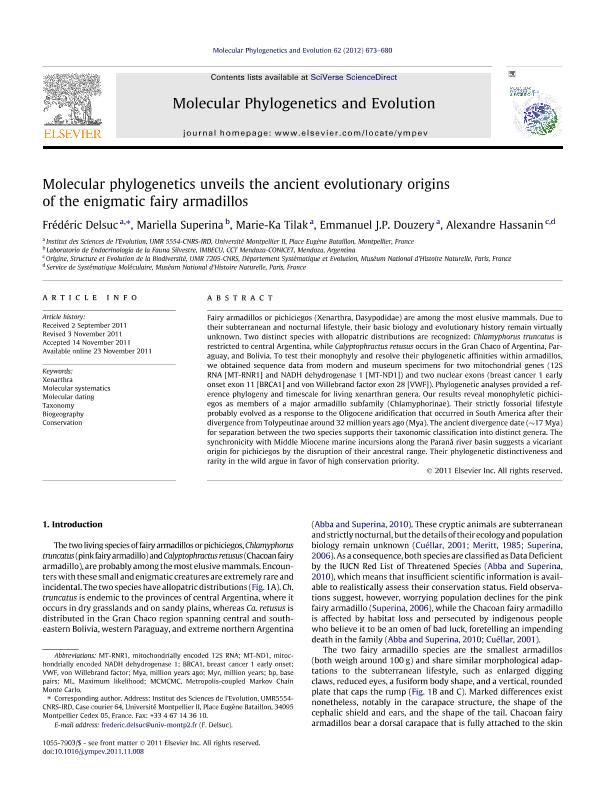Mostrar el registro sencillo del ítem
dc.contributor.author
Delsuc, Frédéric
dc.contributor.author
Superina, Mariella

dc.contributor.author
Tilak, Marie-Ka
dc.contributor.author
Douzery, Emmanuel J. P.
dc.contributor.author
Hassanin, Alexandre
dc.date.available
2019-08-27T18:21:34Z
dc.date.issued
2012-02
dc.identifier.citation
Delsuc, Frédéric; Superina, Mariella; Tilak, Marie-Ka; Douzery, Emmanuel J. P.; Hassanin, Alexandre; Molecular phylogenetics unveils the ancient evolutionary origins of the enigmatic fairy armadillos; Academic Press Inc Elsevier Science; Molecular Phylogenetics and Evolution; 62; 2; 2-2012; 673-680
dc.identifier.issn
1055-7903
dc.identifier.uri
http://hdl.handle.net/11336/82270
dc.description.abstract
Fairy armadillos or pichiciegos (Xenarthra, Dasypodidae) are among the most elusive mammals. Due to their subterranean and nocturnal lifestyle, their basic biology and evolutionary history remain virtually unknown. Two distinct species with allopatric distributions are recognized: Chlamyphorus truncatus is restricted to central Argentina, while Calyptophractus retusus occurs in the Gran Chaco of Argentina, Paraguay, and Bolivia. To test their monophyly and resolve their phylogenetic affinities within armadillos, we obtained sequence data from modern and museum specimens for two mitochondrial genes (12S RNA [MT-RNR1] and NADH dehydrogenase 1 [MT-ND1]) and two nuclear exons (breast cancer 1 early onset exon 11 [BRCA1] and von Willebrand factor exon 28 [VWF]). Phylogenetic analyses provided a reference phylogeny and timescale for living xenarthran genera. Our results reveal monophyletic pichiciegos as members of a major armadillo subfamily (Chlamyphorinae). Their strictly fossorial lifestyle probably evolved as a response to the Oligocene aridification that occurred in South America after their divergence from Tolypeutinae around 32 million years ago (Mya). The ancient divergence date (~17. Mya) for separation between the two species supports their taxonomic classification into distinct genera. The synchronicity with Middle Miocene marine incursions along the Paraná river basin suggests a vicariant origin for pichiciegos by the disruption of their ancestral range. Their phylogenetic distinctiveness and rarity in the wild argue in favor of high conservation priority.
dc.format
application/pdf
dc.language.iso
eng
dc.publisher
Academic Press Inc Elsevier Science

dc.rights
info:eu-repo/semantics/openAccess
dc.rights.uri
https://creativecommons.org/licenses/by-nc-sa/2.5/ar/
dc.subject
Biogeography
dc.subject
Conservation
dc.subject
Molecular Dating
dc.subject
Molecular Systematics
dc.subject
Taxonomy
dc.subject
Xenarthra
dc.subject.classification
Biología

dc.subject.classification
Ciencias Biológicas

dc.subject.classification
CIENCIAS NATURALES Y EXACTAS

dc.subject.classification
Conservación de la Biodiversidad

dc.subject.classification
Ciencias Biológicas

dc.subject.classification
CIENCIAS NATURALES Y EXACTAS

dc.subject.classification
Genética y Herencia

dc.subject.classification
Ciencias Biológicas

dc.subject.classification
CIENCIAS NATURALES Y EXACTAS

dc.title
Molecular phylogenetics unveils the ancient evolutionary origins of the enigmatic fairy armadillos
dc.type
info:eu-repo/semantics/article
dc.type
info:ar-repo/semantics/artículo
dc.type
info:eu-repo/semantics/publishedVersion
dc.date.updated
2019-06-11T15:09:12Z
dc.journal.volume
62
dc.journal.number
2
dc.journal.pagination
673-680
dc.journal.pais
Países Bajos

dc.journal.ciudad
Amsterdam
dc.description.fil
Fil: Delsuc, Frédéric. Université Montpellier II; Francia
dc.description.fil
Fil: Superina, Mariella. Consejo Nacional de Investigaciones Científicas y Técnicas. Centro Científico Tecnológico Conicet - Mendoza. Instituto de Medicina y Biología Experimental de Cuyo; Argentina
dc.description.fil
Fil: Tilak, Marie-Ka. Université Montpellier II; Francia
dc.description.fil
Fil: Douzery, Emmanuel J. P.. Université Montpellier II; Francia
dc.description.fil
Fil: Hassanin, Alexandre. Museum National D'histoire Naturelle de Paris; Francia
dc.journal.title
Molecular Phylogenetics and Evolution

dc.relation.alternativeid
info:eu-repo/semantics/altIdentifier/doi/http://dx.doi.org/10.1016/j.ympev.2011.11.008
dc.relation.alternativeid
info:eu-repo/semantics/altIdentifier/url/https://www.sciencedirect.com/science/article/pii/S1055790311004799
Archivos asociados
